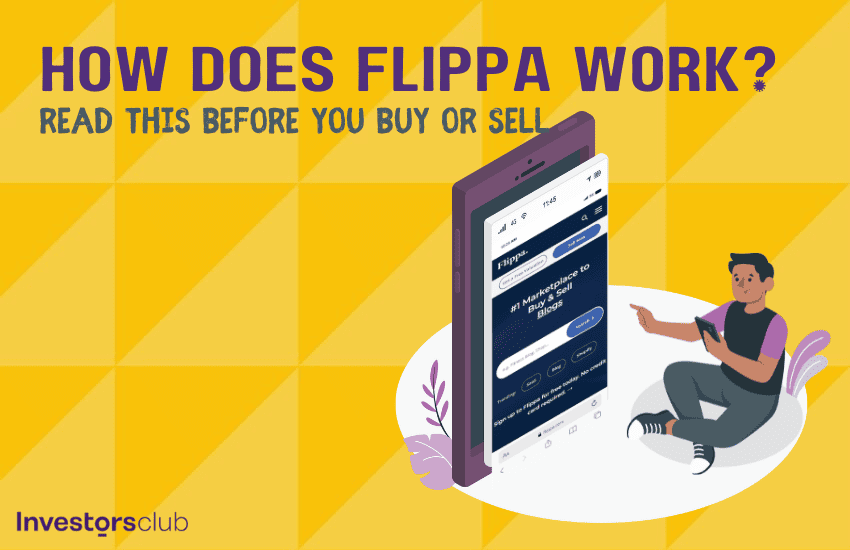Flippa is the oldest and most well-known marketplace for buying and selling websites and online businesses, but its number of listings and light moderation can make new users feel overwhelmed. This article covers all the important details about how Flippa works, what you can buy and sell, how to buy and sell, and tips for success.
Whether you want to buy or sell a digital asset, this guide explains all the essential details.
What Is Flippa?
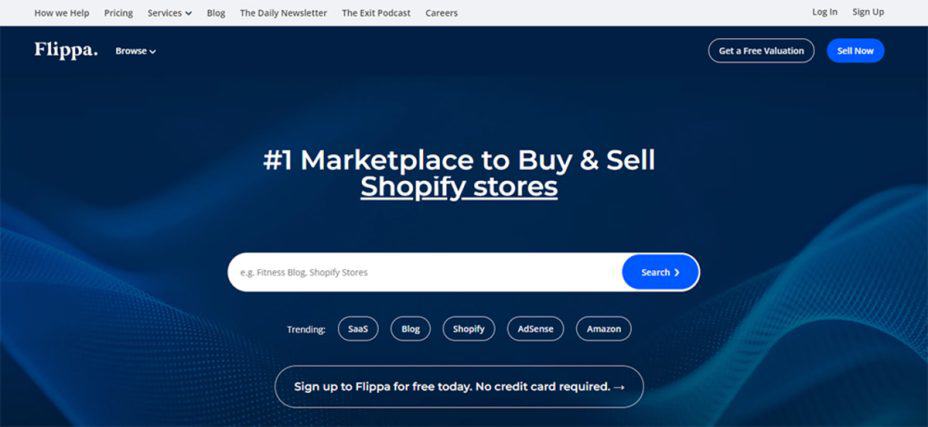
Flippa is an online marketplace that connects buyers and sellers of websites, domain names, apps, and online businesses. Founded in 2009, it was the first marketplace of its kind. Although many other marketplaces and online business brokers exist today, Flippa is still one of the most popular choices for buyers and sellers.
Related reading: 7 Best Sites Like Flippa: Legit Alternatives
Flippa’s open nature is one of the reasons the platform is home to so many listings. While most other marketplaces and brokers take a more selective approach and only list websites or businesses that meet specific criteria, Flippa allows sellers to list nearly anything.
Depending on your perspective, Flippa’s open approach may be a pro or a con. On the positive side, sellers can list assets for sale that other platforms would reject, and buyers have more options. However, Flippa’s low standards lead to a large volume of low-quality listings buyers have to sift through, and legit sellers have a harder time standing out.
Flippa has also developed a reputation for hosting scams and fraudulent listings. The company itself is not a scam but, because they don’t verify listings below $50,000, buyers have to be cautious.
Due to the need for extensive caution and due diligence, Flippa is better suited for investors with acquisition experience than for first time buyers and sellers.
Those looking for a curated marketplace with a more manageable number of listings, as well as verified buyers and sellers, may be interested in Investors Club. Read our Investors Club vs. Flippa comparison for more details.
What Can You Buy or Sell on Flippa?
Flippa allows users to buy and sell a wide variety of digital assets, including established and profitable websites, starter sites, mobile apps, domain names, and other online businesses (SaaS, agencies, etc.).
Although Flippa takes an open approach, it does have some restrictions. For example, you can’t sell websites or businesses with adult content, anything that sells or promotes weapons, or anything illegal.
Unlike most marketplaces and brokers, Flippa doesn’t have minimum revenue or profit requirements. Low-revenue and pre-revenue businesses are accepted. However, you can also sell established and highly profitable websites and businesses.
Our analysis of the typical listing price is shown below, with a percentage of listings that are micro (less than $10k), small ($10k – $100k), medium ($100k – $1 million), and large (over $1 million).
| Micro | Small | Medium | Large | |
| Flippa | 71.4% | 19.8% | 7.0% | 1.8% |
| Investors Club | 2.3% | 63.6% | 27.3% | 6.8% |
Types of Listings
Flippa offers a few different listing types. Auctions and classifieds can be “for sale by owner” (sold by the owner without a broker) or listed by a broker on a client’s behalf.
Auction
Flippa’s auction listings function similarly to eBay. Sellers can set a reserve, the lowest price they will accept. The highest bidder wins the auction as long as the reserve is met (auction listings show when the reserve has been met). If the reserve isn’t met, there’s no sale.
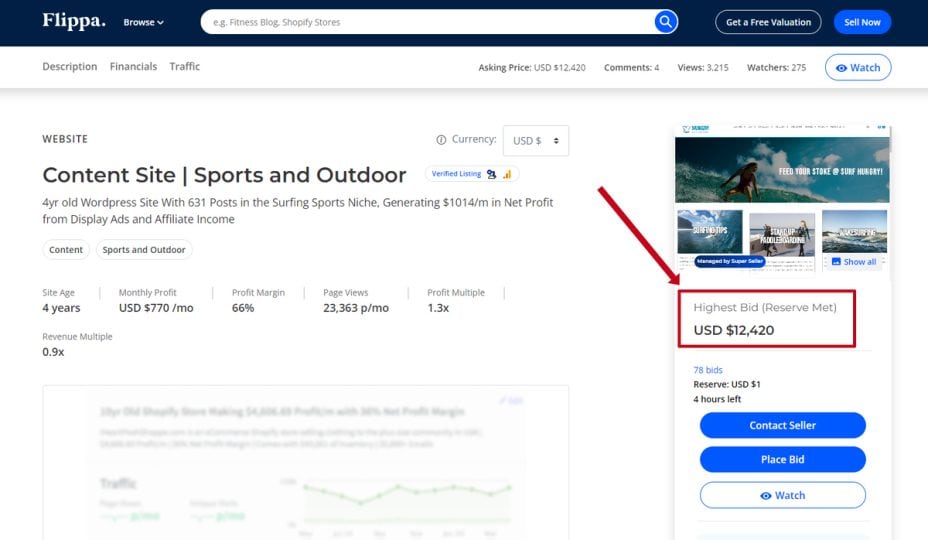
Auction listings give sellers a chance to secure a high price if there’s competition from multiple buyers. However, auctions can also result in lower prices, giving buyers a chance to grab an undervalued asset.
Classifieds
Classified listings have an asking price. Flippa offers an automated tool to provide a valuation estimate, but sellers set their own asking price. Interested buyers can make an offer, which the seller can accept or reject.

Brokered
A brokered service is available for listings above $100,000. Sellers get the assistance of an advisor who assists with the valuation, creating the listing, promoting the listing, communicating with potential buyers, negotiating the sale, and more.
Fees
Flippa’s fee structure is more complex than that of most marketplaces and brokers. The basics are covered below, but we also have a more detailed article dedicated to Flippa fees.
Listing Fee
Sellers must pay a listing fee that varies from $29-$699, depending on the chosen package. This fee is due before the listing is published and not refundable if the site or business doesn’t sell.
Success Fee
Flippa also charges sellers a success fee if the site or business sells. This fee goes up to 10%, depending on the price.
Upgrades
Sellers can pay an additional $199 for a confidential listing, which hides the business’s name and URL until the buyer has signed a non-disclosure agreement (NDA).
Flippa also offers private listings for $599. Private listings aren’t visible on Flippa’s website. Instead, their team presents your listing to directly to potential buyers.
Flippa also offers legal document templates for $199.
Brokered Listing Fees
Sellers of brokered listings pay $999 for a nine-month listing. The success fee varies from 3-8%, depending on the price.
First Access Fees
In 2023, Flippa launched its First Access program, an optional upgrade for buyers. First Access subscribers pay $49 per month to access listings 21 days before non-paying users. While buyers pay this fee, it negatively impacts sellers by reducing the exposure of listings for three weeks.
Escrow Fees
Buyers who want the added safety and security of paying via escrow must pay additional fees. Flippa offers FlippaPay, plus slightly discounted rates through Escrow.com. The table below shows the fees at various prices.
| Transaction Amount | FlippaPay | Escrow.com |
| $10,000 | $50 | $140.49 |
| $50,000 | $250 | $355 |
| $100,000 | $500 | $710 |
| $500,000 | $2,500 | $3,550 |
| $1,000,000 | $5,000 | $7,100 |
Overall, Flippa’s fees are higher than those of many marketplaces. Investors Club charges no listing fee and no success fee, so sellers can keep all of the money from their sales. All Investors Club listings are confidential, whereas Flippa charges an additional fee for confidentiality.
| Fees | Flippa | Investors Club |
| Listing fee | $49 – $599 | $0 |
| Success fee | Up to 10% | 0% |
| Legal templates | $199 | n/a |
| Private listing | $199 | free |
Buying a Website on Flippa
Here are the basic steps in buying a website or business on Flippa.
1. Create Your Account
Anyone can browse listing titles and prices without an account, but you have to create an account to see the full listing details, contact a seller, place a bid, or purchase a business. A basic account is free, but you won’t have access to listings until they’ve been on the site for at least 21 days. You’ll need to upgrade to a First Access account to access listings immediately.
2. Determine Your Budget
Decide how much you’re willing and able to spend on a website or business. Keep in mind the additional fees for escrow and migration. Flippa doesn’t offer migration assistance, but you can hire a developer if you need help.
Keep the different listing types in mind. Browsing classified listings within a budget is easy because you can filter and sort by the asking price. However, auction prices can rise quickly. Knowing the limitations of your budget is especially important when bidding on auctions to avoid spending more than you intended.
3. Determine Your Criteria
What are you looking for in a website or business? Do you want an established site or a starter site? Do you want a content-based website, e-commerce site, SaaS business, or something else?
It’s also helpful to know if you want a site with a specific level of traffic or certain types of traffic (organic search, social media, email, etc.).
4. Browse the Listings
Once you know your budget and what you’re looking for, it’s time to start browsing. Finding what you’re looking for can take some time, partly because Flippa has so many listings. You can filter the Flippa listings to help you find what you want.
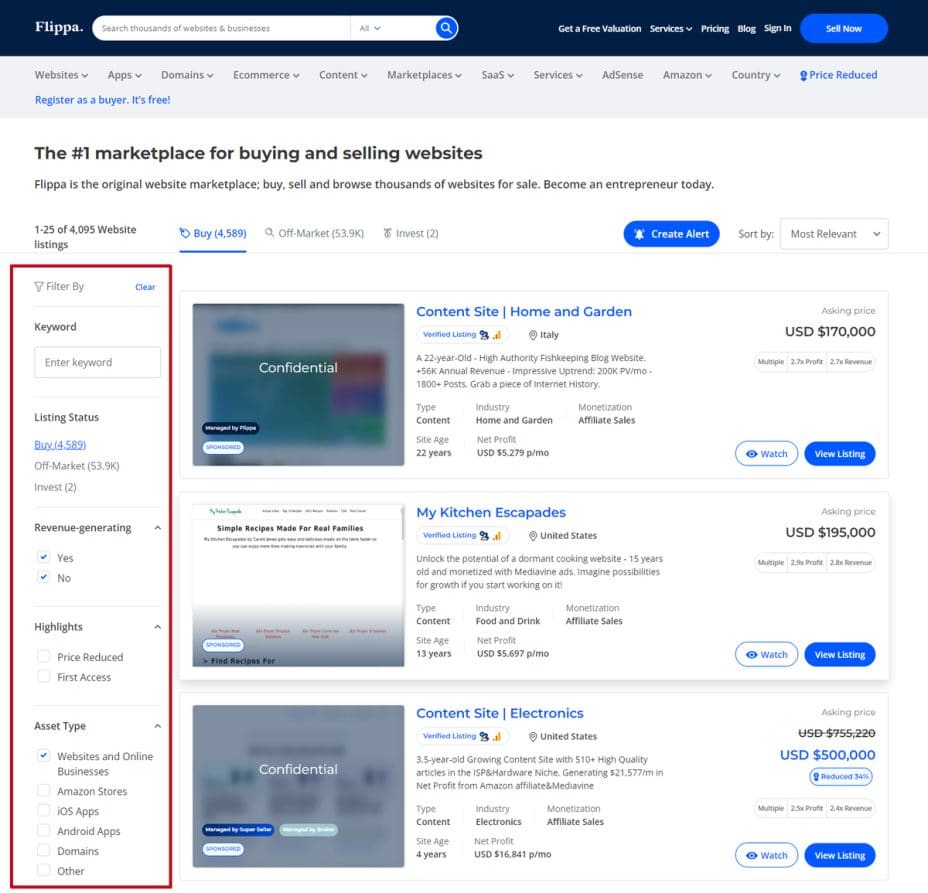
5. Contact Sellers
You can contact sellers with any questions. Some sellers provide more details in the listing than others, so you may need to ask for more information. You should always get access to Google Analytics and Search Console before making an offer or placing a bid.
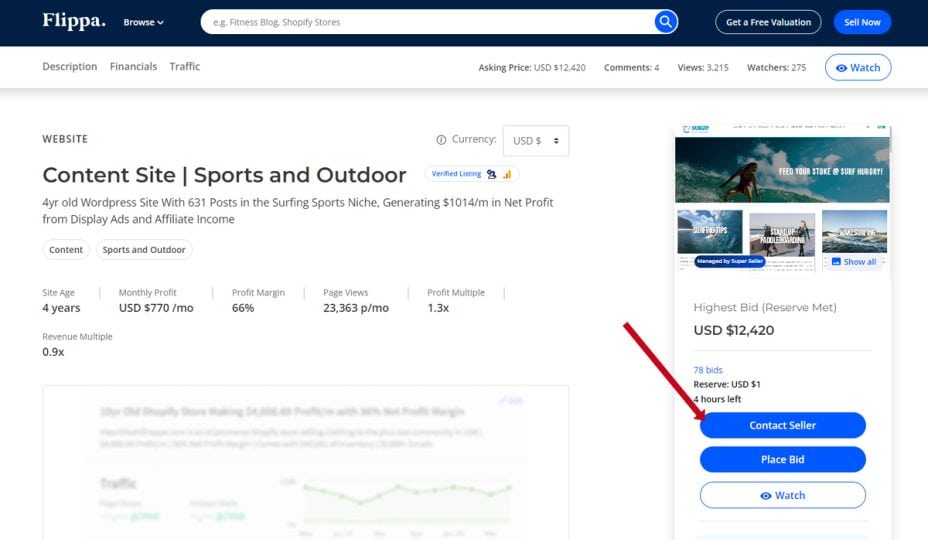
Contacting sellers and asking questions is also a good way to determine which sellers are the most responsive. A seller’s lack of responsiveness or cooperation for basic issues may be a red flag. You’ll want to find someone easy to work with throughout the transaction.
6. Conduct Thorough Due Diligence
Flippa recommends that buyers perform due diligence before bidding or making an offer. This includes checking the Whois history and website history (using the Wayback Machine), analyzing financials, looking for potential trademark issues, etc.
7. Make an Offer and Negotiate
If you find a website or business you want to buy, it’s time to make an offer (classified listing) or place a bid (auction listing). If you bid on an auction listing, you’ll need to watch for higher bids to decide if you want to increase your bid. Flippa has a notification system to help with monitoring listings.

If you make an offer on a classified listing, the seller will accept, reject, or counter your offer. You can then negotiate until you reach an agreed-upon price.
8. Prepare Legal Documents
Flippa offers sellers legal document templates as an upgrade ($199). If the seller chose one of the higher-priced listing packages, the legal doc templates may be included. As a buyer, you can also opt for one of the legal packages offered by Flippa, but they start at $1,000.
If you need personalized advice or assistance, you can hire an attorney to review the legal docs before signing.
9. Complete the Purchase
Once all the necessary documents are signed, it’s time to complete the sale. Flippa offers an escrow service for an additional fee. If you opt for the escrow service, you’ll deposit money into an escrow account, and that money will be released to the seller after they transfer all the assets to you.
Unfortunately, Flippa doesn’t offer assistance with migration or site transition. It’s up to the buyer and seller to handle that part of the process. The migration can be easy or complex, depending on the site’s details and business model.
Investors Club streamlines the buying process by verifying every listing and providing detailed information for due diligence, free legal doc templates, free escrow service, and free migration.
How to Sell on Flippa
Here’s the basic process for selling a website or online business on Flippa.
1. Prepare Your Website
Before listing your website on the Flippa marketplace, make sure it’s ready to sell. This includes ensuring all assets and content are transferable and the site performs as intended with no technical issues or errors. Remember that potential buyers will scrutinize the site before bidding or placing an offer, so you’ll need to have everything in order.
2. Gather Your Data
Next, gather the information for your listing, such as financials, website traffic stats, and screenshots. Make sure you have all of this ready before creating your listing. Including more details in your listing will help potential buyers, while also reducing the number of questions you receive.
3. Create Your Account
You’ll need an account on Flippa before creating a listing. There’s no cost to create an account and it only takes a few minutes.
4. Create the Listing
After you set up your account, it’s time to create your listing. The process includes providing details about your website or business, uploading photos and screenshots, setting a price, and choosing the appropriate listing type (classified or auction). You’ll choose the package you want and pay the listing fee. Remember that the listing fee and optional add-ons are not refundable if the site doesn’t sell.
5. Respond to Questions
After your listing is published, potential buyers may have questions about your website or business. Be prompt in responding to these questions and provide as much information as needed. Potential buyers evaluate sellers in addition to the website or business, and earning their trust will go a long way toward getting a bid or an offer.
6. Receive Offers and Negotiate
If you’ve chosen a classified listing, buyers can make an offer if they’d like to buy your site. You can accept, reject, or counter their offer.
Buyers will place bids and compete for your site if you’ve chosen an auction listing. Flippa asks you to approve the buyer when they make their first bid on your listing. You won’t see the bid amount until you’ve approved the buyer, but you can check their profile to see their Flippa history. Once you’ve approved the buyer, they can place additional bids without approval.
7. Prepare the Legal Documents
After you’ve accepted an offer or an auction ends with a bid that meets or exceeds the reserve, it’s time to prepare the legal documents. As mentioned earlier, Flippa offers templates for a $199 fee, or you can use your own docs. It’s best to have your attorney review the documents before signing.
8. Complete the Sale
Lastly, it’s time to complete the sale. Flippa offers an optional escrow service (for a fee) that helps protect both parties. Additionally, you’ll need to work with the buyer to transfer the site and all assets included in the sale.
Flippa Tips for Buyers
Here are some specific tips to keep in mind for staying safe and getting the best results.
Be Wary of Scams
Unfortunately, Flippa has a reputation for hosting scams. Be cautious of deals that seem too good to be true or sellers who don’t want to cooperate. There are too many details to cover here, but we have another article on common Flippa scams that explains the specifics.
Verify All of the Seller’s Claims
Verifying everything yourself is one of the keys to avoiding scams. Flippa claims to verify traffic and revenue for listings over $50,000, but they don’t verify listings below $50,000. It’s a good practice to verify everything yourself, even if Flippa claims to have already verified it.
You should verify the site’s traffic by getting access to Google Analytics and Search Console. Use third-party documents (like bank and PayPal statements) to verify revenue.
Be Ready to Take Action
When you find a site you’re interested in, be ready to act. Do your due diligence and ask questions, but make an offer (for classified listings) quickly if you really want the site. The longer you take, the more likely it is that someone else will buy it. The timeline and pace varies depending on the listing, but you don’t want to miss an opportunity because you weren’t ready to act.
Auction listings have a set ending date, and the listing shows how many days are left. If you’ve found a site that you want to buy, be sure to place a bid before the auction ends. You don’t need to wait until the last minute because if a new highest bid is placed within the last hour, the clock resets to 60 minutes so other buyers have an opportunity.
Buy With Escrow
As mentioned, Flippa offers an escrow service for a fee. Using this service for any transaction you make on the platform is recommended. Escrow protects buyers and sellers by ensuring the money is in the account before the assets are transferred and that the assets are transferred before the money is released to the seller.
Flippa Tips for Sellers
Here are some specific tips for achieving a successful sale on the Flippa platform.
Be Realistic With Your Asking Price
Flippa allows sellers to set the asking price (classified) or reserve (auction). An unrealistic price is likely to chase buyers away, so you’ll want to be sure that your price is in line with industry standards. Flippa offers a free automated valuation tool to help you determine an appropriate price. You can also check other listings to see the multiples used for valuations.
Investors Club also offers a free valuation calculator for determining your business’s value.
Create a Detailed Listing
The best Flippa listings provide potential buyers with plenty of details and information. Gathering and including all necessary data will help your listing stand out and attract serious buyers.
You can include a brief history of the site, details on the key features or selling points, and growth opportunities.
Promote the Listing on Your Own
While Flippa has a large audience, you should also promote your listing on your own through social media and other channels (like an email list, if you have one). If you’re not concerned with website visitors knowing that you’re looking to sell, you can also add a notice and a link to the Flippa listing from your site. These promotions can help attract more potential buyers and increase the chances of a sale.
Be Responsive
Be prompt in responding to questions and offers from potential buyers. Doing so will help build trust and encourage them to move forward. If you’re slow to respond or not helpful, the buyer might move on to another listing.
Be Honest
Honesty is crucial when selling a website or business on Flippa or anywhere else. Be transparent about any potential issues or risks associated with the site, as it’s better to address them upfront than to have a buyer discover them later.
Being honest will help build trust, as Flippa buyers are typically skeptical and alert for potential scams. Showing that you’re honest can also help you stand out from other sellers.
Final Thoughts
Flippa is a popular choice for buyers and sellers, but its history of hosting scams means users need to exercise caution. Experienced buyers and sellers may be able to navigate the challenges and succeed on the platform, but those who prefer a curated marketplace with no seller fees may prefer Investors Club.
If you’re interested in selling, try our free valuation tool to see what your website may be worth. If you’re interested in buying, create a free account and get started.

Online Business Builder & Content Strategist
Marc has been building websites and online businesses since 2007. He’s built successful businesses in several industries, including web/graphic design, photography, travel, and personal finance. Marc is the founder of Flip My Site, where he writes about buying and selling websites.
Connect with Marc:
Linkedin | Twitter | FlipMySite

